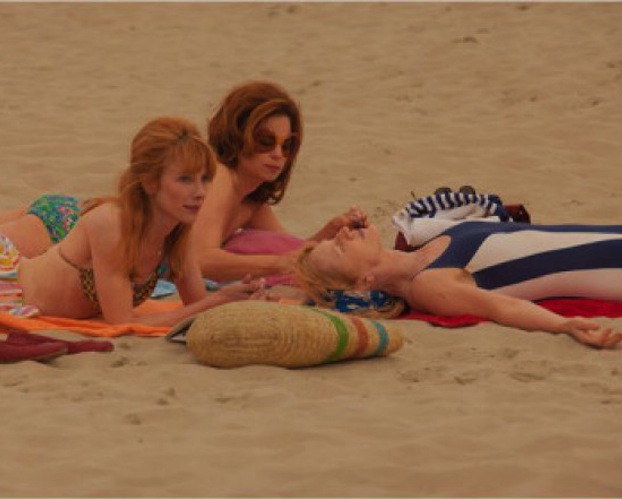Film Review: “À la Vie” — A Flawless Study of Time and Trauma
À la Vie, screening as part of the 18th Annual Jewish Film Festival, is easily the best film I have seen so far this year.

A scene from Jean-Jacques Zilbermann’s brilliant film “À la Vie.”
By Paul Dervis
The 18th Annual Jewish Film Festival continues this week with a gripping mood piece, writer-director Jean-Jacques Zilbermann’s À la Vie (screening on May 11 at the Kendall Square Cinema in Cambridge.), which spans from the dark last days of Auschwitz to the bucolic summer of 1962. Like life itself, nothing is simple in this absorbing movie about time and trauma.
Helene is a young, shy Holocaust survivor, arriving in Paris with little more than the clothes on her back. She is taken in by a sympathetic French woman and slowly establishes a small niche for herself. At first she can find no one from the camps and is dependent on the family that helps her. Amongst the family members is a brother, the equally shy Raymond. he dreams of a life with Helene, and it seems possible…that is, until she discovers Henri, another survivor…one she had been in love with in Auschwitz. They marry and Raymond never does.
Helene attributes living through the war to her close friend and fellow kitchen worker Lily. She believes Lily made it out as well, and never stops looking for her. Helene posts searches for Lily in a periodical for well over a decade until they finally find each other. Lily has been in Amsterdam living as a writer. They plan a reunion in the beach community of Berck, France, where the long-suffering Raymond owns a little apartment on the water that he gives to Helene for the weekend. Helene is a bundle of nerves as she awaits her soulmate. And it turns out that Lily has a surprise for her.
A third friend, Rose, arrives with Lily. Helene was sure Rose had died in those last few days in the camp and had repressed her memories of her. But, in fact, Rose was saved by a Russian soldier who she eventually married and moved with to Montreal, where they live a simple life.
In lesser hands, this film could have dissolved into trite melodrama, but the writers, director, and cast never wallow in sentimentality. Refreshingly, they take the opposite tact. The relationship among these three survivors as they approach middle age is handled with a sharp and profound complexity. All suffer deep scars from their shared experiences, and grapple with layers if conradictory emotions when they are reunited. Lily is a pioneering feminist who is writing a book about why women should be allowed to be rabbis. She is divorced and totally independent; there’s the veiled suggestion that she might be a lesbian. She also harbours a dark secret about something she did at the end of their internment, something that may have saved Rose’s life but damned another woman to death. Helene still loves her husband, but their relationship is troubled because of experiments that the Nazis subjected poor Henri to in Auschwitz. And Rose, though a mother several times over, painfully rejects her children…and that behavior is also rooted in a a horrendous camp experience.
Visually, this film is stunning. Seamlessly journeying from darkness to light, somehow it creates a modulated panorama of color that manages to be both muted and vibrant. It is as much its wealth of images as the performances of the cast that generates the film’s indelible mood of hope and regret.
Which is not to downplay the actors. They are flawless.
Julie Depardieu, as Helene, brings a brittle strength to her damaged character. Struggling with a distorted body image, she is coaxed into putting on a bikini for the beach by her friends. Hunched over in her revealing suit, she evokes the now familiar image of the nothing-but-bones victims of Nazi Germany concentration camps, yet all the while she brings a quiet dignity to Helene’s predicament.
Johanna ter Steege, playing Lily, is the story’s truth seeker. She demands confessions of reality from her cohorts, and she gets them. Her no nonsense drive holds the three together: it is as if now she can play the role of protector, a position that she couldn’t take two decades earlier.
Suzanne Clement, as Rose, embodies a painful dichotomy; she is obviously tormented by her past losses yet she is attempting to deny her pain and live life as a lighthearted party girl. Her performance suggests a head-spinning juxtaposition: it is as if a young Annette Funicello was cast as Anne Frank. Clement pulls off this challenging balancing act brilliantly.
It is rare to leave a film feeling fully satiated. But À la Vie offers up a full helping of artistry and then some. It is easily the best film I have seen so far this year. Every young filmmaker needs to see this because this is what they should be striving to create. Do not miss it.
Paul Dervis has been teaching drama in Canada at Algonquin College as well as the theatre conservatory Ottawa School of Speech & Drama for the past 15 years. Previously he ran theatre companies in Boston, New York, and Montreal. He has directed over 150 stage productions, receiving two dozen awards for his work. Paul has also directed six films, the most recent being 2011’s The Righteous Tithe.
Tagged: À la Vie, Auschwitz, french film, Holocaust, Jean-Jacques Zilbermann, Johanna ter Steege, Julie Depardieu, Paul Dervis

I caught this film while covering the festival for The Jewish Advocate. It really is as wonderful as Paul describes.